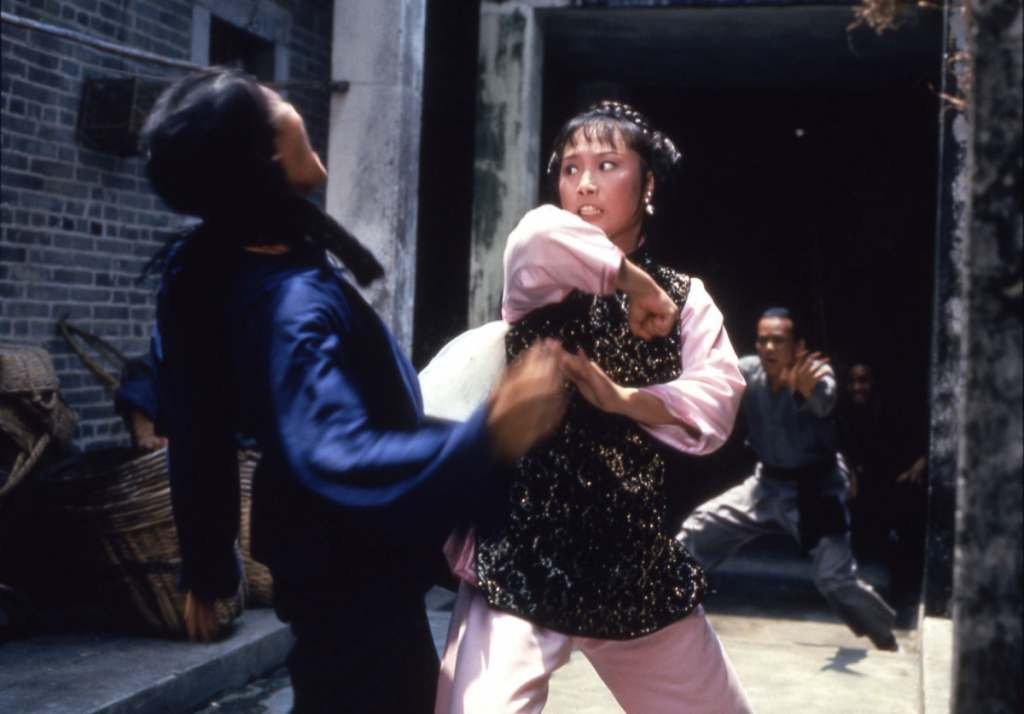At times like this I really miss websites like HKFlix, a now-defunct online DVD retailer through which I would continue to discover old kung fu classics in the aftermath of the 90s Hong Kong crossover success of the likes of Jackie Chan and Jet Li. Cheong Chang-hwa’s memorable classic, Broken Oath, was certainly one of them, and remained intangible to me only until now with its Special Edition release on Blu-Ray from Eureka Entertainment.
The long-and-short of the 1977 flick though sees screen legend Angela Mao in the role of Jie Lian, who findself her exiled from the Buddhist monastery where she was raised, due to her belligerent nature. After learning the truth about her past, and with the help of her godmother and a wily pickpocket, Jie Lian sets out to avenge her late mother’s wrongful imprisonment at the hands of a quartet of four assassins who murdered her husband, a Qing general. Little does Jie Lian know that her action will chaotically intertwine with a group of imperial spies looking to infiltrate the assassins who’ve since stationed themselves as part of an effort to overthrow the Emperor.
Broken Oath isn’t very tightly woven, storywise, with just a few areas that bode more suggestive in terms of connectivity from point-to-point. The brilliance of the film though, is the spectacle and innovation through which Cheong’s revenge remake is executed. Mao’s performance leaves a bit to be desired in a few areas, but her role is nonetheless carried on with plenty of vigor and charm, invoking a mischievous air par for the course as she battles her way through swarms of villains. Her use of scorpions is an enlivening touch for her character as she evens the odds between battles.
Jie Lian’s journey of revenge isn’t a straight line however, which adds just a little more intrigue at times with at least one character who has since found himself on a much more redemptive path. The film makes clear that her godmother gave her to the monastery so that the abbess can help raise and cultivate her away from the cycle of violence that ended her mother’s life twenty years earlier. Per the film, Jie Lian’s supposedly violent nature takes its course and her exile from the monastery bodes as more of a necessary step toward her own enlightenment which eventually paves the way for the film’s revenge plot.
The more gripping mystique of the film comes by way of some of the characters who make their way into the story. You don’t yet know the spies are actually spies and you don’t know who their alliances are with, but it’s fun guessing at times what feels so obvious. You get the feeling that these aren’t necessarily villains, but it’s interesting seeing where the story takes us with them. Moreover, at least two of the four supposed antagonists who tease this aspect of themselves well enough with at least one that still keeps you guessing as he treads in the background, all but hiding his face until later on in the film. That’s where the action comes in, choreographed by Hsu Hsia and Yuen Woo-Ping, showcasing Mao in some of her best and most memorable action scenes and set pieces in history.
I also loved Toshiya Fujita’s 1973 manga adaptation, Lady Snowblood, when I finally got to watch it in the last few years. It makes Broken Oath an endearing addition to my experience given that this is remake of that film, and with Mao in what would apparently be her final role for a Golden Harvest production before transitioning to other projects. It’s a pretty damn layered one too, considering its enduring legacy over the years, and the number of famous faces in the stunt and action backdrop like Corey Yuen and Lam Ching-Ying, and co-stars Bruce Leung and Sammo Hung to name a few.
These details and more are all pointed out on the Blu-Ray which itself is packed with two versions of the movie, which does make for an interesting discussion about the story and overall plot. Its primary presentation comes featured with English and Mandarin Audio, and Audio Commentary by film expert Frank Djeng who deals out a listicle of many of the actors and supporting co-stars’ careers, as well as some of the historical and cultural significances of the props and set pieces showcased in the film, including the creative freedom over Mao’s long hair against that of her bald counterparts within the monastery.
Djeng also details some of the core differences between the main theatrical cut, and the extended Mandarin cut of the film which also includes a much more embellished commentary on these aspects of the film and more by Eureka regulars Mike Leeder and Arne Venema. Comparisons to Female Prisoner 701: Scorpion, the film that launched the compelling Meiko Kaji-led revenge saga in 1972 aren’t out of the question, particularly with mention of actress Naomi Oka who is included in the augmented sequences, and whose career shares prominent space with Kaji’s in the Toho’s famed prison girls subgenre; Oka’s appearance also marks a reunion with Cheong and Mao following 1974’s The Association.
The disc further includes two video essays by Andrew Heskins and Patrick Macias (12 minutes and 8 minutes, respectively), chiming in on the film’s lasting legacy with regard to the films and their stars, and the shelf life they’ve gained over the years. Eureka also markets an interview with co-star Leung for its U.S. release which unfortunately wasn’t on the disc that was sent to me to review, although I reckon it’ll be available upon its release with Eureka now officially launching the Blu-Ray on Tuesday.


